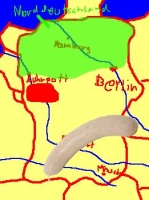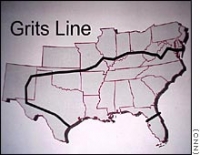One of Denmark’s income earners is a weekend package to get married. It’s directed particularly at US soldiers marrying Germans.
Marriage in Denmark/Heiraten in Dänemark (a site in English, German, Spanish and Portuguese)
Heiraten-leicht-gemacht.de wants to help all bi-national couples who have difficulties to get married in Germany or in other European countries. We will show you the way to a fast, legal and unbureaucratic marriage.
Bi-national couples in Germany or in other European countries need to master endless bureaucratic hurdles to get married. The main problem here in Germany seems to be the ‘Ehefähigkeitszeugnis’ (a certificate which formally enables you to marry) from the home country of the non-German partner.
The latter is rather easy and legally possible to avoid when getting married in DENMARK. This is where our concept starts. We would like to show you an easy, unbureaucratic and cheap way to get married in Denmark.
Our special offer is the EXPRESS-WEDDING – you will get married in Denmark within 24 hours.
(Ehefähigkeitszeugnis: certificate of no impediment)
Nelly at Head over Heels is a German about to get married to an American in Germany (We should have went to Denmark and see also Die standesamtliche Hochzeit). She has collected tips and links for other Germans wanting to marry Americans:
This is getting ridiculous. I’ve been looking for a translator and interpreter for hours. You see, we can’t just get the papers translated by any translator and we can’t just hire any interpreter to come with us to the courthouse. I searched on the official associations website for interpreters and translators but ya know what? Most of them don’t translate birth certificates anymore, most of them don’t do the weddings anymore. It’s not good enough for them. They could lose a better job over it and we can’t afford them anyway. That is what I was told a dozens of times.
She’s unhappy at having to pay 100 euros for an interpreter for the registration and another 100 euros for the ceremony. The registration is said to take 30 minutes, but I don’t know what the interpreter’s travel time would be.
These are German translators translating long US birth certificates into German, which is more expensive than German into English (and with luck, the German can buy a multilingual birth certificate from the register office). I am not sure how they say no on the phone, but ‘I might lose a better job’ or ‘You can’t afford me’ don’t seem to be the way to go.
I think it’s true that if I charged the right price for a certified translation of a private document (the price that gives me an hourly rate I can live on), only one in ten potential private clients would not be outraged. I used to charge a lower price and half the clients were also outraged. On top of that, a lot of time can be spent when the customer brings the original documents and collects the translation, and of course one doesn’t charge for that time. It seems to compound the problem common with other customers too that they may think translation is typing in another language.



